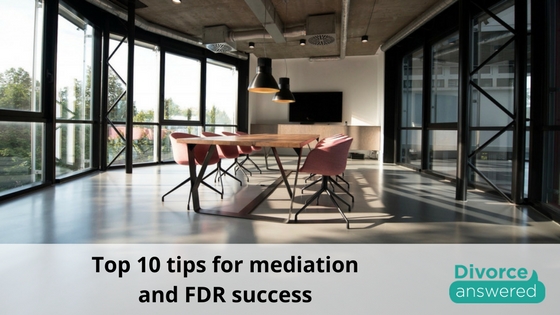Top 10 tips for mediation and FDR success

Mediation can be one of the best and most rewarding and one of the more cost-effective steps to reach resolution in your separation. Rachael Scharrer, divorce expert and founder of DivorceAnswered.com.au shares her top 10 tips on how to get the best outcome in mediation and family dispute resolution (FDR) and achieve a sense of success!
When you are preparing for and attending mediation, keep the following in mind:
- Confirmation. For some parties, mediation or FDR is court ordered or strongly encouraged by their legal professional. Ensure that you offer confirmation and receive confirmation from the other party regarding attendance and willingness to compromise before the mediation date. The last thing you want to do is waste your time and money if you or the other party aren’t going to participate fully
- Have an agenda. Prior to mediation, think about what you consider to be a fair and reasonable outcome – what is the ideal outcome and what would you take in the least. Write down the points that you feel need addressing in mediation. If you prepare your headspace prior to mediation while you are in the comfort of your home, you will be able to get more out of the process
- Actively participate in mediation. Turning up isn’t enough. You need to be willing to talk and be open to resolving the matters. There has to be some give-and-take in terms of listening and trying to understand the other person’s perspective. Try to find some middle ground
- Understand that if you don’t reach an agreement, court is a far more expensive alternative. If you don’t achieve what you want in mediation, court could be the answer. But, consider the potential downsides to court: a lot of time and money, a worse relationship with the other parent, tension for your children and an uncertain outcome. Mediation is a less stressful alternative reaching a solution. Remember if you don’t finish everything on the one day in mediation and provided that you were making in-roads during mediation, you can schedule another date to complete the process
- Try to work with the best parts of the other parent. Create a plan or agreement that works for each parent while considering their work arrangements and personal commitments. Remember to keep the children’s needs, routines and commitments in mind as well
- Compromise. It is incredibly rare to find a couple equally split the asset pool and it is almost impossible when children are involved. While you may have to offer your ex-spouse more of the asset pool or take less than you had hoped for, think about how much you may spend if you end up in a protracted court case – you could end up spending hundreds of thousands of dollars
- Something is better than nothing. You won’t end mediation with everything you wanted. No one walks away from a mediation agreement thinking they got all of the assets and unfortunately, everyone thinks that they are a little ‘hard done by.’ The freedom of certainly and having an agreement in place is worth so much more than what you didn’t receive
- Be open with the other party. Be open to the process. Don’t attend feeling like you are forced to be there. Make the most of the opportunity to resolve the conflict or disagreements. This is an occasion to tell your story, share what you want/need and leave getting some or all of what you want
- When you get stuck, move on. Sometimes people spend so much time trying to get something relatively insignificant and create a ‘mountain out of a mole-hill.’ Try to avoid spending too much time disagreeing about the little things, like a pick-up time or pick-up location. Try to come back to it later on in the mediation process. The sentiment ‘we wasted so much time and hardly covered anything’ is echoed by all people that spend far too long on the minor and insignificant details.
- Be respectful at all times. Whether you are in FDR or in your daily life, be respectful to your ex-partner. There are ways to convey your thoughts and feelings without name calling, using swear words or talking down about (or to) the other person. Your mediation will proceed more smoothly and you will achieve so much more when you are respectful and listen to the other party
Remember, The mediator is a facilitator and a neutral party in the process. They are not a decision maker or opinion giver. No matter what they think or feel, it is up to the participants to convey their message and needs clearly with the other party.
For more suggestions on family dispute resolution and mediation, review these articles:
Family dispute resolution and 60I Certificate and
Mediation tips from an expert mediator
Preparation is key - for specific support preparing yourself for mediation or a conciliation conference, book a Strategy Session today.
Disclaimer
This is general advice only and is not provided as legal advice. If you have a legal issue, you should contact a lawyer and/or accountant before making a decision about what to do or applying to the Court. DivorceAnswered.com.au cannot provide legal advice. If you have an emergency situation, please contact Emergency '000'. © Divorce Pty Ltd
